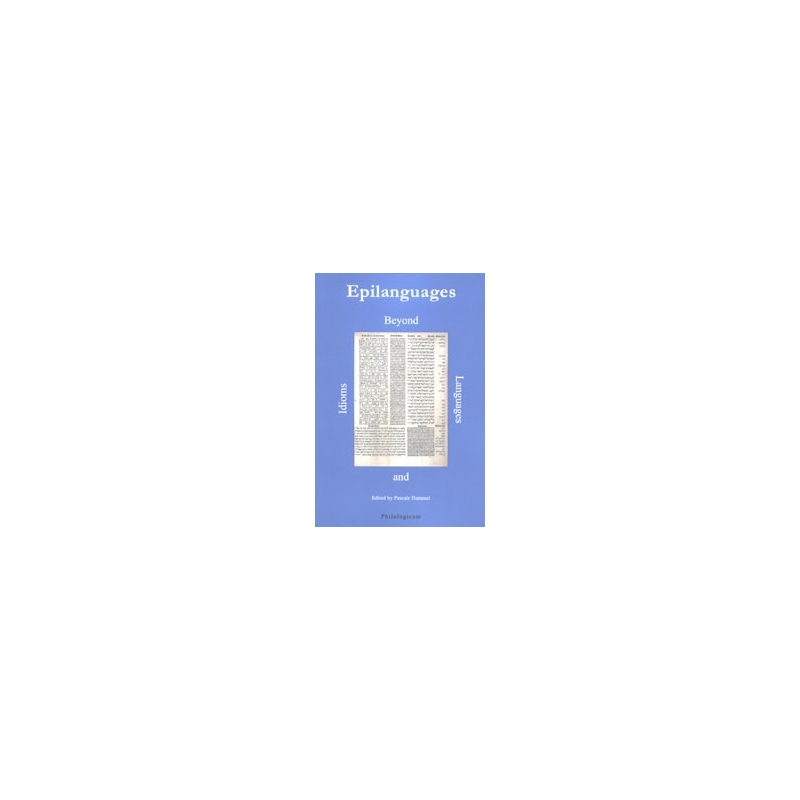- Exclusivité web !
- Rupture de stock

Reférence :: DLGM-060421-01
Éditeur :: Librairie Hachette
Reférence :: DLGM-231009-02
Éditeur :: Ophrys
Reférence :: DLGM-150508-03
Éditeur :: Domus latina
Reférence :: BD-071107-10
Éditeur :: Egmont Ehapa Verlag


Hummel, Pascale,
En anglais,
Philologicum, 2009,
16 x 24, 235 pages, broché.
Neuf, 9782917741153
Garanties de sécurité
Politique de livraison
Politique de retours
Edited by Pascale Hummel. In the history of scholarship, scholars daily practicing vernacular idioms have successively been writing and/or speaking Latin and English as the vehicular languages used to communicate texts and ideas. Somewhere between archiphonemes/archisemes and metalanguages, which could be considered semi-synonyms, the “epilanguages” are the linguistic realities and results generated by the use of a second language for scholarly and scientific purposes. What kind of thought does a scholar produce when (s)he uses these epilanguages (mostly Latin or English)? How does (s)he think, and what does (s)he write? How differently does his/her thinking and writing work when (s)he uses the vehicular (epilinguistic) tools? The contributors to this volume investigate how in the present and in the past the conceptual and linguistic shifting from the vernacular to the vehicular has generated what we could call an “epilinguistic” way of thinking. To what extent are the texts created in this way more far-distant from their mental sources, even maybe sounding “schizophrenic” (i.e. cut-off from reality), than the texts the same scholar would write in his own idiom? What are the specific characteristics of these texts: objectivity, cerebrality, artificiality, epiphenomenality, coldness, impersonality, conventionality, formularity, stereotypicality, or other traits one may think of? The contributors question their own experience as much as the historical examples available from the different centuries of history of scholarship. All the fields of science and knowledge (outside of philology and linguistics themselves) are being explored. Already the author of about thirty books, Pascale Hummel is a philologist, historian of philology and translator (notably of Lou Andreas-Salomé). She is in charge of several research programs on the teaching of Greek as well as on the history of ignorance and the transmission of knowledge (Institut national de recherche pédagogique, Paris). Her most recent works also deal with the history of ideas, literature and arts.
Fiche technique
Aucun avis n'a été publié pour le moment.
Reférence :: PLGL-130812-01
Éditeur :: Librairie philosophique J. Vrin
Reférence :: PLGL-250407-05
Reférence :: PLGL-120213-07
Éditeur :: Le Caire - IFAO
Reférence :: PLGL-260509-12
Éditeur :: Librairie ancienne Honoré Champion
Reférence :: PLGL-301009-07
Éditeur :: C. Klincksieck
Reférence :: PLGL-031108-04
Éditeur :: Hachette
Reférence :: PLGL-050620-01
Éditeur :: Les Belles Lettres
Reférence :: PLGL-1106-6
Reférence :: PLGL-1106-42
Éditeur :: Les Belles Lettres
Reférence :: PLGL-020409-12
Éditeur :: Albin Michel
Reférence :: PLGL-280910-06
Éditeur :: Les Belles Lettres
Reférence :: PLGL-250407-11
Éditeur :: Editions Peeters

Hummel, Pascale,
En anglais,
Philologicum, 2009,
16 x 24, 235 pages, broché.
Neuf, 9782917741153